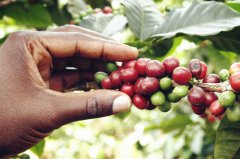Introduction to washed Arabica beans and coffee beans in Papua New Guinea
The coffee beans of Papua New Guinea are processed washed Arabica beans with a taste similar to the bright notes of Central and South America, with obvious sour aromas, sometimes orange, flower and fruit, slightly spicy and chocolate, and long-lasting sweet aromas of caramel.
Flavor reference: refreshing herbaceous and floral aromas, tonality of Central and South American beans, slightly sour, fruity, sticky, full taste, subtle aroma and complexity, sometimes acid value and brightness even comparable to the top coffee beans in Central America.
Unique: although the acidity is high, it does not lose the sense of balance, and there are rich high-tone flavor changes, including floral aromas and citrus tonality similar to grapefruit.
However, it is almost inevitable that the surge in production leads to a decline in quality. Before 1991, the quality of coffee was good, and most of it belonged to open Y and so on. After 1991, the quality gradually declined, and with it the European market was lost. The extra price of coffee such as Y also gradually fell. This is related to the country's policy of "one grade, one price". This policy is not feasible for an industry as volatile as coffee. As a result, poor quality coffee beans have damaged the image of high quality standards for coffee such as Y, creating a backlog in Papua New Guinea, where about 75 per cent of coffee products come from small local farms. Many farms reclaim land in the forest, and some are in the depths of the forest, almost isolated from the rest of the world. Coffee in the country is grown on highlands between 1300 and 1800 meters above sea level, so it is of high quality. Although coffee is also grown in some lowlands, the yield is relatively small. Most of the locally grown coffee is grown under natural conditions because of the problems and high costs of transporting chemical fertilizers and pesticides to the farm.

Important Notice :
前街咖啡 FrontStreet Coffee has moved to new addredd:
FrontStreet Coffee Address: 315,Donghua East Road,GuangZhou
Tel:020 38364473
- Prev

Typical Panamanian Bouqete High altitude Coffee flavour Panamanian Jade Manor (La Esmeral
Boutique coffee (specialty coffee) is also called specialty coffee selection coffee. It refers to coffee made from a small number of raw beans with excellent taste grown in an ideal geographical environment. Depending on the special soil and climatic conditions in which they grow, they have outstanding flavor. After strict selection and classification, this kind of coffee is hard in texture, rich in taste and stylish.
- Next

Honey-treated Nicaraguan Coffee introduces Los Congo Manor Joy Manor Matagalpa producing area
Lemon Tree Manor also processes coffee in a honey-treated way. After the coffee fruit is actually picked, the coffee with its exocarp removed is put on the African shed to dry. Compared with the traditional way of placing coffee directly on the ground to dry coffee, using African shed to dry coffee can reduce more pollution in the drying process, avoid producing more miscellaneous smell, and finally improve the quality of coffee.
Related
- Does Rose Summer choose Blue, Green or Red? Detailed explanation of Rose Summer Coffee plots and Classification in Panamanian Jade Manor
- What is the difference between the origin, producing area, processing plant, cooperative and manor of coffee beans?
- How fine does the espresso powder fit? how to grind the espresso?
- Sca coffee roasting degree color card coffee roasting degree 8 roasting color values what do you mean?
- The practice of lattes: how to make lattes at home
- Introduction to Indonesian Fine Coffee beans-- Java Coffee producing area of Indonesian Arabica Coffee
- How much will the flavor of light and medium roasted rose summer be expressed? What baking level is rose summer suitable for?
- Introduction to the characteristics of washing, sun-drying or wet-planing coffee commonly used in Mantenin, Indonesia
- Price characteristics of Arabica Coffee Bean Starbucks introduction to Manning Coffee Bean Taste producing area Variety Manor
- What is the authentic Yega flavor? What are the flavor characteristics of the really excellent Yejasuffi coffee beans?

